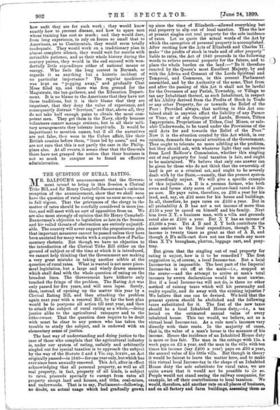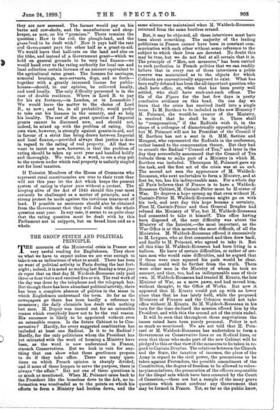THE QUESTION OF RURAL RATING.
MR. BALFOUR'S announcement that the Govern- ment intend to bring in this Session a Clerical Tithe Bill, and Sir Henry Campbell-Bannerman's ominous reception of the announcement, show that we shall soon have the question of rural rating upon us once more,—and in full vigour. That the grievances of the clergy in the matter of rates should be carefully considered is mere jus- tice, and will meet with no sort of opposition from us. We are also most strongly of opinion that Sir Henry Campbell- Bannerman's objection to legislation so late in the Session and hie veiled threats of obstruction are entirely unjustifi- able. The country will never support the preposterous plea that important measures cannot be passed unless they have been anointed for many weeks with a copious flow of Parlia- mentary rhetoric. But though we have no objection to the introduction of the Clerical Tithe Bill either on the ground of subject or of the time at which it is introduced, we cannot help thinking that the Government are making a very great mistake in taking another nibble at the question of rural rates. What is wanted is not more piece- meal legislation, but a large and wisely drawn measure which shall deal with the whole question of rating on the broadest lines. The Government have hitherto only touched the fringe of the problem. The Rating Act was only passed for five years, and will soon lapse. Surely, then, instead of opening up the matter this year by a Clerical Rating Bill, and then attacking the problem again next year with a renewal Bill, by far the best plan would be to postpone all action till next year, and then to attack the subject of rural rating as a whole,—doing justice alike to the agricultural ratepayer and to the tithe-owner. That the question does require to be dealt with must be clear to any person who has taken the trouble to study the subject, and is endowed with an elementary sense of justice.
The best way of understanding and doing justice to the case of those who complain that the agricultural industry is, under our system of rating, unfairly and arbitrarily singled out for special taxation is to approach the subject by the way of the Statute 3 and 4 Vic. cap. lxxxiv., an Act originally passed—in 1840—for one year only, but which has ever since been annually renewed. This Act, after in effect acknowledging that all personal property, as well as all real property, in fact, property of all kinds, is subject to rates, proceeds specially to exempt from rates all property except land and houses, and tithe, coal-mines, and underwoods. That is to say, Parliament—following, no doubt, an actual usage which had gradually grown up since the time of Elizabeth—allowed everything but real property to slip out of local taxation. Thus the law at present singles out real property for the sole incidence of rates. Let us quote the actual words of the Act by which the exemption of personal property is accomplished. After reciting how the Acts of Elizabeth and Charles 'II. make " the profits of stock in trade and of other property" liable to rates, the Act of 1840 proceeds in the following words to relieve personal property for the future, and to place the whole burden on the land :—" Be it therefore enacted by the Queen's most Excellent Majesty, by and with the Advice and Consent of the Lords Spiritual and Temporal, and Commons, in this present Parliament assembled, and by the Authority of the same, That from and after the passing of this Act it shall not be lawful for the Overseers of any Parish, Township, or Village to tax any Inhabitant thereof, as such Inhabitant, in respect of his Ability derived from the Profits of Stock in Trade or any other Property, for or towards the Relief of the Poor : Provided always, that nothing in this Act con- tained shall in anywise affect the liability of any Parson or Vicar, or of any Occupier of Lands, Houses, Tithes Impropriate, Propriations of Tithes, Coal Mines, or sale- able Underwoods, to be taxed under the Provisions of the said Acts for and towards the Relief of the Poor." Now it is the situation created by this Act which, in our opinion, demands the special attention of the Government. They ought to tolerate no more nibbling at the problem, but they should ask, with whatever light they can receive from Lord Balfour's Commission, whether this singling out of real property for local taxation is fair, and ought to be maintained. We believe that only one answer can be given by those who do not think that the ownership of land is per se a criminal act, and ought to be severely dealt with by the State,—namely, that the present system is exceedingly unjust. We will give a specific example of this injustice. A B is a yeoman farmer, who both owns and farms sixty acres of pasture-land rated at 30s. an acre. He pays rates, therefore, on £90 a year for his land, and, say, on £10 more for his house and buildings. In all, therefore, he pays rates on £100 a year. But in all probability A B has not a net income of more than £150 a year to spend on himself and his family. Next him lives X Y, a business man, with a villa and grounds rated also at £100 a year. But X Y has an income of £3,000 a year. Yet A B and .X Y both contribute the same amount to the local expenditure, though X Y's income is twenty times as great as that of A B, and though A B's milk-cart does not use the roads any more than X Y's brougham, phaeton, luggage cart, and pony- trap.
But given that the singling out of real property for rating is unjust, how is it to be remedied ? The first suggestion is, of course, a local Income-tax. But a local Income-tax is impossible. The best part of the Imperial Income-tax is cut off at the main—i.e., stopped at the source—and the attempt to arrive at men's total incomes by sworn declarations would be most unwise. But if a local Income-tax will not do, is there no other method of raising taxes which will hit personalty and realty equally, and do away with the existing injustice ? We believe that one can be devised. We hold that the present system should be abolished and the following taxes substituted for it. The first of the new taxes should be a local Inhabited House duty,—i.e., a tax levied on the estimated annual value of every inhabited house. This tax would, we believe, act as a virtual local Income-tax. As a rule men's incomes vary directly with their rents. In the majority of cases, that is, the value of a man's house is the measure of his income. Hence the incidence of an Inhabited House duty is more or less fair. The man in the cottage with 15s. a week pays on £5 a year, and the man in the villa with ten times his income (say £400 a year) pays on £50 a year, the annual value of his little villa. But though in theory it would be fairest to leave the matter here, and to make this virtual local Income-tax in the shape of an so. Inhabited we are
Cita
House duty the sole substitute for rural rates, quite aware that it would not be possible to People would not stand seeing the railway companies, for We ft example, let off their contributions to local taxation. would, therefore, add another rate on all places of buineds, and on all factory and farm buildings, assessing them as they are now assessed. The fanner would pay on his barns and cow-sheds, and the manufacturer and shop- keeper, as now, on his "premises." There remains the question : How is the soil, the plough-land, and the grass-land to be dealt with ? Now it pays half the rate and Guvennnent pays the other half as a grant-in-aid. We would leave that half-rate on the land and also on the tithe, and instead of a Government grant—which we hold on general grounds to be very had finance—we would hand over to the rating authority for local use and local collection certain licenses of an amount equivalent to the agricultural rates grant. The licenses for carriages, armorial bearings, men-servants, dogs, and so forth— together with a greatly increased license for public- houses—should, in our opinion, be collected locally, and used locally. The only difficulty presented is in the case of double residence. Where is Lord B. to pay for his six footmen,—in London, or in Loanishire ? We would leave the matter to the choice of Lord B., as now ; and he, in all probability, would prefer to take out his licenses in the country, and so help his locality. The rest of the great question of Imperial grants cannot be discussed now, and should not, indeed, be mixed up with the problem of rating. Our own view, however, is strongly against grants-in-aid, and in favour of a strict line being drawn between Imperial and local finance,—provided always that justice is done in regard to the rating of real property. All that we want to insist on now, however, is that the problem of rating should be taken up next year and handled boldly and thoroughly. We want, in a word, to see a stop put to the system under which real property is unfairly singled out for local taxation.
If Unionist Members of the House of Commons who represent rural constituencies are true to their trust they will not this year let the Act which keeps the present system of rating in vigour pass without a protest. The keeping alive of the Act of 1840 should this year most certainly be challenged as a matter of principle, and a strong protest be made against the invidious treatment of land. If possible an assurance should also be obtained from the Government that they will deal with the whole question next year. In any case, it seems to us quite clear that the rating question must be dealt with by this Parliament not in snippets, but on broad lines and as a whole.



















































 Previous page
Previous page